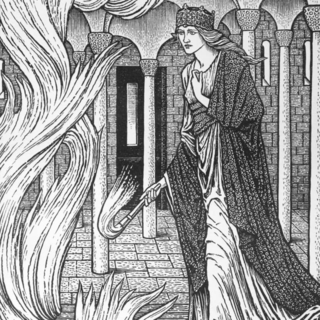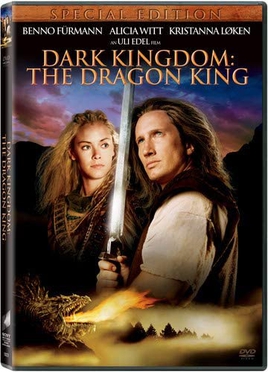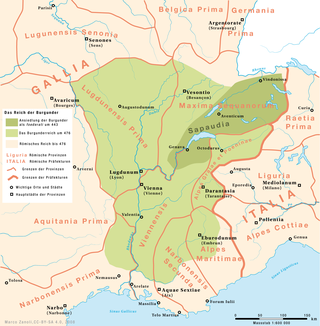Related Research Articles

The Burgundians were an early Germanic tribe or group of tribes. They appeared in the middle Rhine region, near the Roman Empire, and were later moved into the empire, in eastern Gaul. They were possibly mentioned much earlier in the time of the Roman Empire as living in part of the region of Germania that is now part of Poland.

Year 436 (CDXXXVI) was a leap year starting on Wednesday of the Julian calendar. At the time, it was known as the Year of the Consulship of Isodorus and Senator. The denomination 436 for this year has been used since the early medieval period, when the Anno Domini calendar era became the prevalent method in Europe for naming years.

The Nibelungenlied, translated as The Song of the Nibelungs, is an epic poem written around 1200 in Middle High German. Its anonymous poet was likely from the region of Passau. The Nibelungenlied is based on an oral tradition of Germanic heroic legend that has some of its origin in historic events and individuals of the 5th and 6th centuries and that spread throughout almost all of Germanic-speaking Europe. Scandinavian parallels to the German poem are found especially in the heroic lays of the Poetic Edda and in the Völsunga saga.

Brunhild, also known as Brunhilda or Brynhild, is a female character from Germanic heroic legend. She may have her origins in the Visigothic princess and queen Brunhilda of Austrasia.

Gudrun or Kriemhild is the wife of Sigurd/Siegfried and a major figure in Germanic heroic legend and literature. She is believed to have her origins in Ildico, last wife of Attila the Hun, and two queens of the Merovingian dynasty, Brunhilda of Austrasia and Fredegund.

In German heroic legend, Alberich is a dwarf. He features most prominently in the poems Nibelungenlied and Ortnit. He also features in the Old Norse collection of German legends called the Thidreksaga under the name Alfrikr. His name means "ruler of supernatural beings (elves)", and is equivalent to Old French Alberon or Auberon.

Hagen or Högni is a Burgundian warrior in Germanic heroic legend about the Burgundian kingdom at Worms. Hagen is often identified as a brother or half-brother of King Gunther. In the Nibelungenlied he is nicknamed "from Tronje".

Gundaharius or Gundahar, better known by his legendary names Gunther or Gunnar, was a historical king of Burgundy in the early 5th century. Gundahar is attested as ruling his people shortly after they crossed the Rhine into Roman Gaul. He was involved in the campaigns of the failed Roman usurper Jovinus before the latter's defeat, after which he was settled on the left bank of the Rhine as a Roman ally. In 436, Gundahar launched an attack from his kingdom on the Roman province of Belgica Prima. He was defeated by the Roman general Flavius Aetius, who destroyed Gundahar's kingdom with the help of Hunnish mercenaries the following year, resulting in Gundahar's death.

The term Nibelung (German) or Niflungr is a personal or clan name with several competing and contradictory uses in Germanic heroic legend. It has an unclear etymology, but is often connected to the root Nebel, meaning mist. The term in its various meanings gives its name to the Middle High German heroic epic the Nibelungenlied.

Gjúki was the King of the Burgundians in the Germanic heroic legend. He was a member of the Niflungar family, and the father of Gundomar I, Giselher and Gunther.

Dark Kingdom: The Dragon King is a 2004 German television film directed by Uli Edel and starring Benno Fürmann, Alicia Witt, Kristanna Loken and Max von Sydow. The film is based on the Norse mythology story Völsungasaga and the German epic poem Nibelungenlied, which tells the mythological story of Siegfried the Dragon-Slayer. Richard Wagner's music dramas Siegfried and Götterdämmerung are based on the same material. Dark Kingdom: The Dragon King was written by the husband and wife team of Diane Duane and Peter Morwood and is a Tandem Communications production. It was filmed entirely in South Africa.
Gundomar I was eldest son and successor of Gebicca, King of the Burgundians. He succeeded his father in 406 or 407 and reigned until 411. He was succeeded by his brother Giselher.

Die Nibelungen is a two-part series of silent fantasy films created by Austrian director Fritz Lang in 1924, consisting of Die Nibelungen: Siegfried and Die Nibelungen: Kriemhild's Revenge.

Sigurd or Siegfried is a legendary hero of Germanic heroic legend, who killed a dragon—known in some Old Norse sources as Fáfnir—and who was later murdered. It is possible he was inspired by one or more figures from the Frankish Merovingian dynasty, with Sigebert I being the most popular contender. Older scholarship sometimes connected him with Arminius, victor of the Battle of the Teutoburg Forest. He may also have a purely mythological origin. Sigurd's story is first attested on a series of carvings, including runestones from Sweden and stone crosses from the British Isles, dating from the 11th century.

Die Nibelungen is a 1966/1967 West German fantasy film released in two parts, Siegfried von Xanten and Kriemhilds Rache. It was directed by Harald Reinl and produced by Artur Brauner. Die Nibelungen starred Uwe Beyer, Karin Dor and Herbert Lom. The two films were a remake of Fritz Lang's 1924 silent classic Die Nibelungen, which was in turn based on the epic poem the Nibelungenlied.

The Kingdom of the Burgundians or First Kingdom of Burgundy was established by Germanic Burgundians in the Rhineland and then in eastern Gaul in the 5th century.

Das Nibelungenlied is a novel by German writer Albrecht Behmel about the medieval epic of the same name. The story follows the Middle High German original.
Kurt Horres was a German stage director, particularly of opera, and opera manager. He held positions as general manager at the Staatstheater Darmstadt, the Hamburg State Opera, and from 1986 to 1996 at the Deutsche Oper am Rhein. He focused on opera of the 20th century, including composers who had been banned during the Nazi regime, such as Korngold's Die tote Stadt, and literature operas including Gottfried von Einem's Kabale und Liebe, and the world premieres of Blacher's Yvonne, Prinzessin von Burgund, and Klebe's Das Mädchen aus Domrémy. He taught stage direction at the Folkwang University.
Die Nibelungenklage or Die Klage is an anonymous Middle High German heroic poem. The poem describes the laments for and burial of the dead from the Nibelungenlied, as well as the spread of the news of the catastrophe that ended the other poem, and the fates of the various characters who survived. It was likely written at around the same time as the Nibelungenlied, and is appended to it as though it were another episode (âventiure).
References
- ↑ Needler, George Henry, ed. (2015-02-11). "The Nibelungenlied". The Project Gutenberg. Retrieved 2024-02-03.